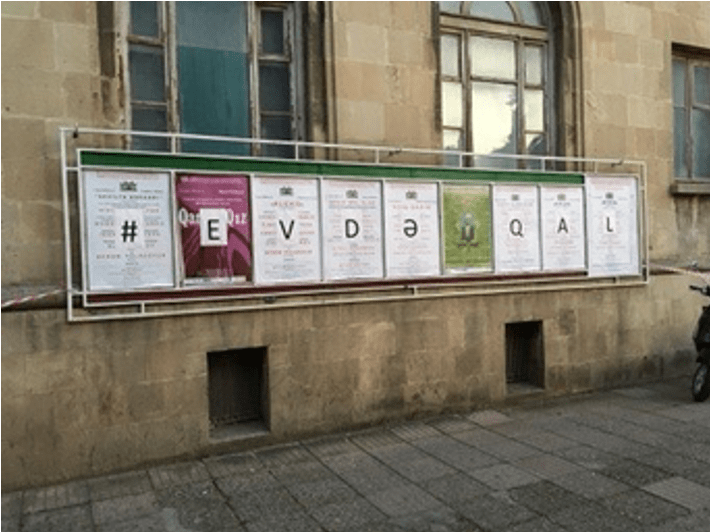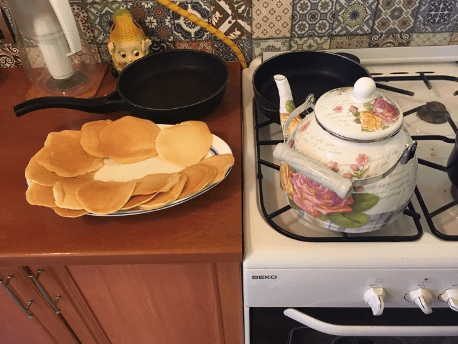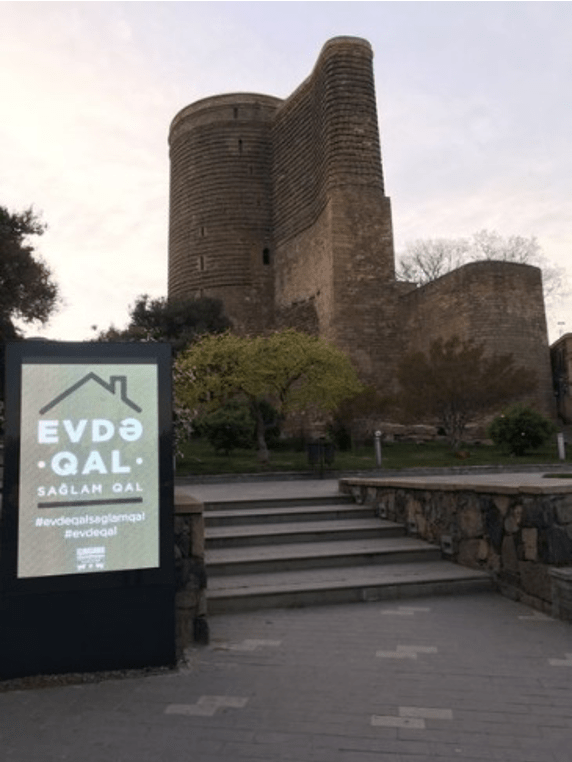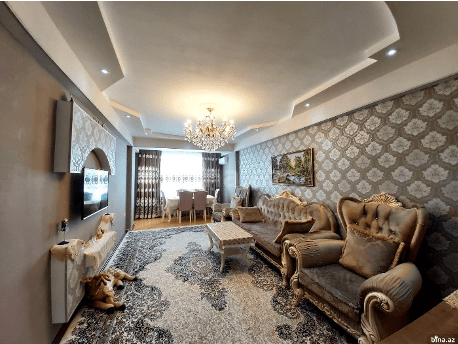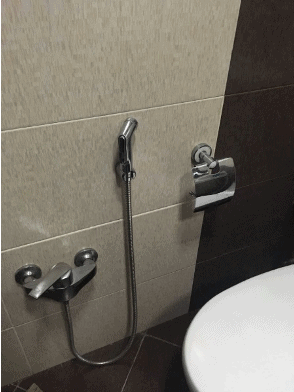How is the Covid-19 crisis experienced around the world? Since 2018, EMGS Alumni Eva Lennartz works for the development policy foundation Sparkassenstiftung für internationale Kooperation in Baku/Azerbaijan and shares her experience in our blog.
#evdəqal – the Azerbaijani equivalent for #stayhome – is the slogan which spread quickly on billboards, in shop windows and on social media in Azerbaijan. In the evening, the words wavered in giant letters across the illuminated façade of the capital’s iconic Flame Towers.
But what does an Azerbaijani home in Baku look like, and how do Azerbaijanis live at home?
When I arrived in Baku as an expat in November 2018, I stayed in a hotel for the first days. Even though it felt very comfortable to find a freshly made bed and a cleaned hotel room every night, I soon had to search for my own apartment for my planned two-year stay in Azerbaijan.
My colleague helped me to make appointments to view different apartments. Estate agent Imdad, a grandfatherly man who always met us with a smile on his lips, led us to the places to be viewed. It quickly became obvious that the search for a simple two room apartment would be difficult. Most of the apartments that I was shown were fully furnished and had at least two bedrooms and bathrooms. With grand furniture, plush sofas, heavy multi-layered brocade curtains and rococo-style wallpapers, I felt transported to a world of palaces.
A couple of viewings later I found an apartment, in which I felt comfortable. Although I would have preferred it without the two embroidered pictures that showed loosely dressed groups of people at a Victorian picnic. One can argue about taste, but why do small apartments seem to be in such short supply on the Azerbaijani housing market?
Even though the model of the nuclear family is increasingly becoming the norm in Azerbaijan, in Baku often two generations live in one household. Some newlyweds look for an apartment in the same building as their parents or, in a society still dominated by men, choose to live with the husband’s family for economic reasons, which can lead to tensions between the mother-in-law and the wife. Talk of the “monster-in-law” is not unknown in other cultures!
On average, Azerbaijani couples have two children who only leave the parental home after their wedding, although this is slowly changing. The label “evdə qalmaq”- “stay at home” – is placed on young women and men of the generation of 25 plus who are not yet married. The daughter joyfully announces to her mother: „I will study mechanical engineering!“. The mother replies: „Jeez, you will stay at home!“.
Elderly people are highly respected in Azerbaijani society and are considered to be the „pillars of the home“. They often help to take care of the grandchildren. I sometimes see the grandparents at my neighbours‘ taking their grandchildren by the hand for a walk in the courtyard. In addition to childcare, the older generation follows the news closely or is interested in Turkish cooking programs and soap operas, the contents of which I was informed about in detail. The Azerbaijani language is closely related to Turkish and therefore easy for most Azerbaijanis to understand.
My apartment was located on the fifth floor in a house from the Soviet era without an elevator. Each time I walked down the stairs to work in the morning and found, at the bottom, that I had forgotten something, I swore. Fortunately, there are services in Baku which deliver drinking water to your doorstep because it is better not to drink tap water. I assume that the delivery service was not thrilled to discover that there was no elevator in my apartment block.
After some time in my new home, I felt that I was missing something. More specifically, furniture. I was lacking a desk and shelving. Most of the furniture was too low and offered no storage space. I am reminded of the Khan Palace in the city of Sheki, which is located in north-western Azerbaijan on the southern edge of the Greater Caucasus, the interior of which is adorned with beautiful filigree paintings and carvings, but apart from small stools and seating on the floor, there are no other furnishings.
If you enter an Azerbaijani apartment, shoes are exchanged for slippers at the entrance, contributing to a sense of cosiness. Home means privacy and constitutes a refuge. At home you can be as you are. The desire for seclusion can also be observed in cafes, restaurants or bars, which sometimes offer private or VIP rooms, so that nothing stands in the way of an unobserved get-together. Paul Magnarella (1974) writes in “Tradition and Chance in a Turkish Town” that when designing the living space in the small Turkish town of Susurluk, the primary goal was to ensure the sanctity of the home and to maintain the safety of women and children, which can be attributed to the volatile and conflict-ridden environment and the danger of external invasion (p. 43). Perhaps this notion is transferable to Azerbaijan, the area of which has historically been characterised by internal fragmentation and foreign invasion (Ismailov, 2017, p. 13).
In the kitchen of an Azerbaijani home, a teapot should always be on the stove. Every housewife in Azerbaijan has her own secret for brewing the predominantly black tea which can be refined with thyme, ginger, rose petals and the like. An acquaintance asked me if I knew how to make tea, which indicates the high level of art that is attributed to this matter. Tea is grown on plantations in the subtropical south of Azerbaijan on the border with Iran. Coffee is less popular and, unfortunately, it is almost impossible to get a “Coffee to Go” before 9 a.m. But I admit that the Azerbaijani tea does taste good and that drinking tea is relaxing.
If you are invited to tea in Azerbaijan, you have to expect that the reception will not be limited to just a glass of tea, but the housewife will conjure up various delicacies that, even if you have already eaten or are not very hungry, cannot be refused. My parents visited Baku last year and a friend invited us to dinner, which was very nice of her. There was lots to eat, including salads, gutab (thinly rolled dough filled, for example, with herbs), and plov, a rice dish, in this case, with chicken. My friend’s father kept filling my parents‘ plate, whilst he himself ate with restraint. Tea with shekerbura (a sweet crescent-shaped pastry filled with ground almonds, nuts and sugar) and pakhlava were then served. A few days later I met my friend’s mother, who found that my parents are very nice, but remarked that they did not eat much.
There is a video on YouTube showing the Slovenian philosopher Slavoj Žižek, in which he establishes the connection between toilets and ideology and explains how this has led to different designs of toilet bowls. People in Azerbaijan were chuckling about the hoarding of toilet paper in Germany during the coronavirus crisis. In Azerbaijan, taps with hoses attached are installed behind almost all toilets. The toilet paper is only used for drying and is therefore dispensable. Personally, however, I have observed an increasing consumption of sunflower seeds, which are not only eaten during the quarantine for culinary reasons but also as a pastime.
In my bedroom I only had a 90 x 100-centimeter mattress topper on my double bed, filled with sheep wool, which meant that I could not take full advantage of the width of the bed. I find it interesting that the duvet is not put into a cover from one end as is customary in Germany, but traditional duvet covers have a slit in the middle and the duvet is covered from there. Children in Azerbaijan often do not have to go to bed before 11 p.m., which reminds me of southern European countries such as Spain or Italy, where it is also normal for children to stay up late. At weekends, Azerbaijanis like a lie-in, and a friend tells me that having to get up at 9 a.m. on Sunday would be far too early.
An acquaintance of mine often looked tired. When I asked him if he could not have a rest in the evening or at the weekend, he said that there was no time for that, as visitors would come by unannounced. When I was studying in Wrocław, Poland, and staying in a dormitory, I had a similar experience: the Azerbaijani students were always on the way to visit each other. Another friend, who originally comes from Sumgayit, a city located about 30 kilometres away from Baku, told me that the people in the residential complex where he then lived, used to meet up in the courtyard and that there was a rich social life. He regrets that, due to digitisation, social life has shifted indoors and that there is now less direct exchange with the neighbours.
In addition to being a mother and having a full- or part-time job, housekeeping is a woman’s duty. The women make sure that the home is flawlessly clean, either by doing it themselves or by making use of a relatively inexpensive household help. In Baku I get the impression that cleaning needs to be done more often, because sand and dust blow in. The Azerbaijani capital is surrounded by oil fields and located in a semi-desert on the Absheron peninsula.
References
Ismailov, D. (2017). History of Azerbaijan (Textbook). Baku: AzMİU NPM.
Magnarella, P. J. (1974). Tradition and change in a Turkish town. New York: Schenkman Pub. Co. (distributed by Halsted Press).
